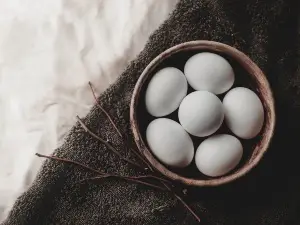
A duckling needs to pip its egg and hatch on its own with no external help. If you try to help the bird then the bird will be weaker than other birds of its age and will have a host of other problems.
But what about if your duckling hasn’t pipped its egg at all? This article looks into it
Table of Contents
Duck eggs not pipping:
Pipping signals the start of the hatching process for ducklings, these birds will pip internally and then pip externally. This is why your bird may have not pipped:
The type of duck:
A duckling will generally pip its egg and hatch about 28 days after the start of incubation, however, this isn’t the case for all types of ducks.
Mallard ducks usually start hatching 28 days into incubation, but other types of ducks, like muscovy ducks, will only start to hatch 35 days into incubation.
What to do:
If you’re waiting for muscovy ducklings to hatch, but the eggs have only been in the incubator for 28 days, then wait till day 35 to see if the bird starts to pip and hatch.
Drowning:
There is a very small chance of a duckling drowning in its egg, but this can happen. If a duckling drowns in its own egg and dies then it will never pip and hatch out of its egg.
Drowning can happen if there is too much humidity in the incubator during incubation.
Too high humidity levels will cause too much water vapor to get into the egg through the porous shell.
This vapor will get into the bird’s nares (nostrils) and the bird will inhale it once it internally pips and takes its first breath, it will then drown in this vapor.
What to do:
If your bird has already died then there isn’t anything you can do to save it.
Check whether your bird is still alive in the egg by listening for vocalizations coming from inside the egg, ducklings make sounds while in the egg when they are close to hatching.
A developed bird, that is close to hatching, will also tap against the eggshell, you’ll be able to hear this too.
If the bird is not making any sounds then you’d need to candle the egg. Candling the egg involves shining the light of a torch behind the egg to see what’s inside. You can also shine the light of a candle behind the bird egg to see inside
If the bird is alive then it will respond to the light, you’ll see movement in the egg and may hear the bird make a noise if the bird is alive.
If the bird does not react by moving or making a sound, when the egg is candled, and the bird has been incubated for long enough, then the bird is likely dead in the egg.
Shrinkwrapping:
Shrinkwrapping happens when humidity levels in the incubator are set too low during the incubation process.
Humidity keeps the membrane in the egg moist. If there isn’t enough humidity in the incubator then the membrane will dry up on the duckling’s body while its in the shell.
Shrinkwrapping will trap the bird and keep it from being able to move and pip.
What to do:
You can help the bird by dampening the membrane. Before you do this, check that the bird is alive by candling the egg.
If you can see movement in the egg, or can hear vocalizations in the egg after you candle the egg, then you can help by creating a small hole at the large side of the egg using a needle.
Be very careful when doing this, do not push the needle in too deep, you may hurt the duckling if you do.
Once you’ve made the opening, wet the egg a bit. Fill a spray bottle with some warm water and spray this water at the hole you’ve just made.
You don’t need to use too much water, just enough to wet the bird’s membrane a bit and allow the bird to hatch out of its shell.
Unfertilized egg:
If you candle your duck’s egg you may realize that the egg was not fertilized in the first place. Fertilized eggs, when candled, will show a network of veins around a mass, unfertilized eggs will be clear when candled
What to do:
If you realize that one of your eggs isn’t fertilized then you’d need to simply remove the unfertilized egg from the incubator, it will never hatch.
If you enjoyed this article then you may also be interested in other duck related articles. Here are some articles that you may be interested in: Newly Hatched Duckling Problems, Weak Duckling, Lethargic Duckling, Duckling Hatched With Unabsorbed Yolk

